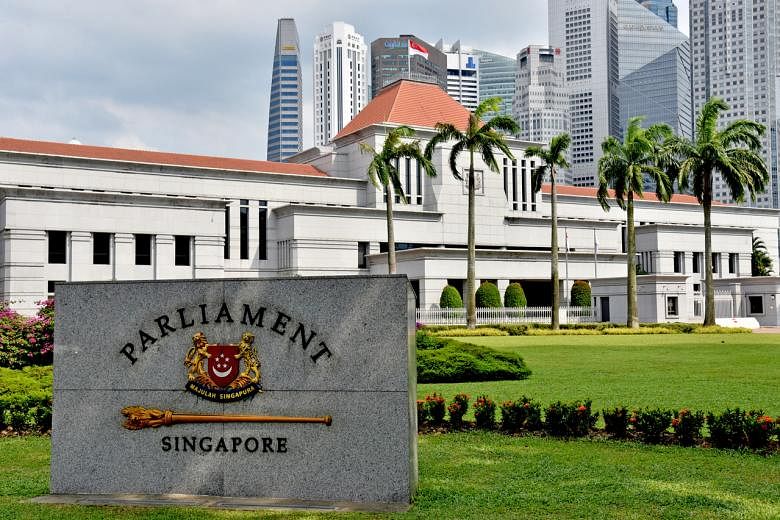SINGAPORE - Parliament will soon be able to meet in multiple locations if necessary, as the House on Tuesday (May 5) passed a constitutional amendment to legally allow this.
Covid-19 has affected how people around the world work, and this includes Parliaments and legislatures around the world, said Leader of the House Grace Fu at the start of debate on the Constitution of the Republic of Singapore (Amendment) Bill.
Prior to this Bill, the law required Parliament to meet in one physical location, said Ms Fu. Certain provisions relating to parliamentary privileges, immunities and powers had also been drafted with reference to Parliament House and its precincts.
This is why MPs being spread out in the Chamber and public galleries since March "was about as far as we can go under the law today", said Ms Fu.
"But it is entirely conceivable that exigencies may make it unsafe or even impossible for us to meet at one place," she added.
"During such exigencies, it is even more critical for Parliament to carry on its constitutional functions of legislating and holding the Government to account."
Ms Fu cited the Covid-19 (Temporary Measures) Act and the Resilience and Solidarity Budgets as examples of the critical role played by Parliament in the last two months.
"In the constitutional framework, we are an essential service," she said.
The new Article 64A in the Constitution creates a mechanism for Parliament to meet under continuity arrangements. When triggered, Parliament need not meet with all MPs in one place, but instead across two or more places appointed by the President, and in communication contemporaneously, or live.
Details of the continuity arrangements will be decided by the House or the Speaker of Parliament, such as where the appointed places will be and the mode of communication between those places. Parliament Standing Orders, or rules, may also be modified, such as the rule on ringing division bells to signal to MPs to vote, said Ms Fu.
When activated, the continuity arrangements will mean MPs can take part in Parliament proceedings fully despite being in separate places, and their presence will count for attendance, quorum and voting purposes. The powers, immunities and privileges of the House will also be extended to apply to continuity arrangements, she added.
"This physical separation will enhance the survivability of Parliament as an institution," said Ms Fu.
"In the context of the Covid-19 situation, separating Members into cohorts and limiting the physical contact between these cohorts allows us to cut down the chance of infection spreading to all the MPs... if one cohort is infected, other cohorts can still carry on."
Ms Fu said that while remote participation - with each MP dialling in from, say, their homes - was considered, the Government decided not to take this path.
As a small country, MPs should be able to travel to alternate sites for Parliament, and Members should be "physically and fully present to apply our minds together to the important business of the Parliament, even if we co-locate between several places".
While continuity arrangements will last for six months at a time when activated by Parliament, Ms Fu said there is currently no need for them to be activated.
But Ms Fu said the lack of certainty over how events will unfold is why the constitutional mechanism was introduced, out of an abundance of caution, through a certificate of urgency signed by the President, which allowed the amendment to be debated and passed in a single sitting.
"If the need arises, for instance, if there is widespread local transmission of Covid-19, we can immediately implement the necessary arrangements," she said.












